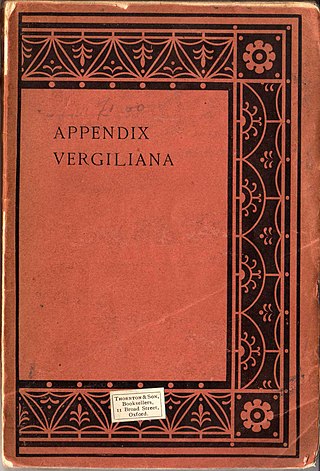
Gaius Valerius Catullus, known as Catullus, was a Latin neoteric poet of the late Roman Republic. His surviving works remain widely read due to their popularity as teaching tools and because of their personal or sexual themes.
Salting the earth, or sowing with salt, is the ritual of spreading salt on the sites of cities razed by conquerors. It originated as a curse on re-inhabitation in the ancient Near East and became a well-established folkloric motif in the Middle Ages. The best-known example is the salting of Shechem as narrated in the Biblical Book of Judges 9:45. The supposed salting of Carthage is not supported by historical evidence.

Irrumatio is a form of oral sex in which someone thrusts their penis into another person's mouth, in contrast to fellatio where the penis is being actively orally excited by a fellator. The difference lies mainly in which party takes the active part. By extension, irrumatio can also refer to the sexual technique of thrusting the penis between the thighs of a partner.
Satire VI is the most famous of the sixteen Satires by the Roman author Juvenal written in the late 1st or early 2nd century. In English translation, this satire is often titled something in the vein of Against Women due to the most obvious reading of its content. It enjoyed significant social currency from late antiquity to the early modern period, being read as a proof-text for a wide array of misogynistic beliefs. Its current significance rests in its role as a crucial body of evidence on Roman conceptions of gender and sexuality.

The Appendix Vergiliana is a collection of Latin poems traditionally ascribed as being the juvenilia of Virgil.

Catullus 64 is an epyllion or "little epic" poem written by Latin poet Catullus. Catullus' longest poem, it retains his famed linguistic witticisms while employing an appropriately epic tone.

Catullus 1 is traditionally arranged first among the poems of the Roman poet Catullus, though it was not necessarily the first poem that he wrote. It is dedicated to Cornelius Nepos, a historian and minor poet, though some consider Catullus's praise of Cornelius's history of the Italians to have been sarcastic.

Catullus 3 is a poem by Roman poet Gaius Valerius Catullus that laments the death of a pet sparrow (passer) for which an unnamed girl (puella), possibly Catullus' lover Lesbia, had an affection. Written in hendecasyllabic meter, it is considered to be one of the most famous of Latin poems.

Catullus 2 is a poem by Roman poet Gaius Valerius Catullus (c. 84 – c. 54 BCE) that describes the affectionate relationship between an unnamed puella ('girl', possibly Catullus' lover, Lesbia), and her pet sparrow. As scholar and poet John Swinnerton Phillimore has noted, "The charm of this poem, blurred as it is by a corrupt manuscript tradition, has made it one of the most famous in Catullus' book." The meter of this poem is hendecasyllabic, a common form in Catullus' poetry.
Catullus 101 is an elegiac poem written by the Roman poet Gaius Valerius Catullus. It is addressed to Catullus' dead brother or, strictly speaking, to the "mute ashes" which are the only remaining evidence of his brother's body.

Catullus 7 is a poem by Catullus addressed to his mistress Lesbia. Similar to Catullus 5, this poem revels in counting kisses, with a touch of stellar voyeurism.

Catullus 4 is a poem by the ancient Roman writer Catullus. The poem concerns the retirement of a well-traveled ship. Catullus draws a strong analogy with human aging, rendering the boat as a person that flies and speaks, with palms and purpose.

Catullus 12 is a poem by the Roman poet Catullus. In it, he chides Asinius Marrucinus for stealing one of his napkins, calling it uncouth and noting the disapproval of his brother, Pollio. Note the reversal of the praenomen and nomen in the first line. While "Asini Marrucine" could be translated simply as "Asinius Marrucinus", the inverted word order introduces the alternative meaning "Marrucinus [son] of a jackass". Napkins in Ancient Rome were handmade and therefore far more valuable than they are today; also, Catullus has a sentimental attachment to the napkins, as they were a gift from two close friends, Fabullus and Veranius. In comparison to Catullus's other invective poetry, this is relatively light: the main point of the poem could be to praise Pollio rather than to chide Marrucinus.

A Latin Dictionary is a popular English-language lexicographical work of the Latin language, published by Harper and Brothers of New York in 1879 and printed simultaneously in the United Kingdom by Oxford University Press.

Idrieus, or Hidrieus was a ruler of Caria as a Satrap under the Achaemenid Empire. Alongside his sister and wife Ada, he enjoyed the status of king or dynast by virtue of the powerful position he inherited from his predecessors of the House of Hecatomnus.

Catullus 5 is a passionate ode to Lesbia and one of the most famous poems by Catullus. The poem encourages lovers to scorn the snide comments of others, and to live only for each other, since life is brief and death brings a night of perpetual sleep. This poem has been translated and imitated many times.
Catullus 16 or Carmen 16 is a poem by Gaius Valerius Catullus. The poem, written in a hendecasyllabic (11-syllable) meter, was considered to be so sexually explicit following its rediscovery in the following centuries that a full English translation was not published until the 20th century. The first line, Pēdīcābo ego vōs et irrumābō, sometimes used as a title, has been called "one of the filthiest expressions ever written in Latin—or in any other language".

Sir Roger Aubrey Baskerville Mynors was an English classicist and medievalist who held the senior chairs of Latin at the universities of Oxford and Cambridge. A textual critic, he was an expert in the study of manuscripts and their role in the reconstruction of classical texts.

Eclogue4, also known as the FourthEclogue, is a Latin poem by the Roman poet Virgil. The poem is dated to 40 BC by its mention of the consulship of Virgil's patron Gaius Asinius Pollio.















